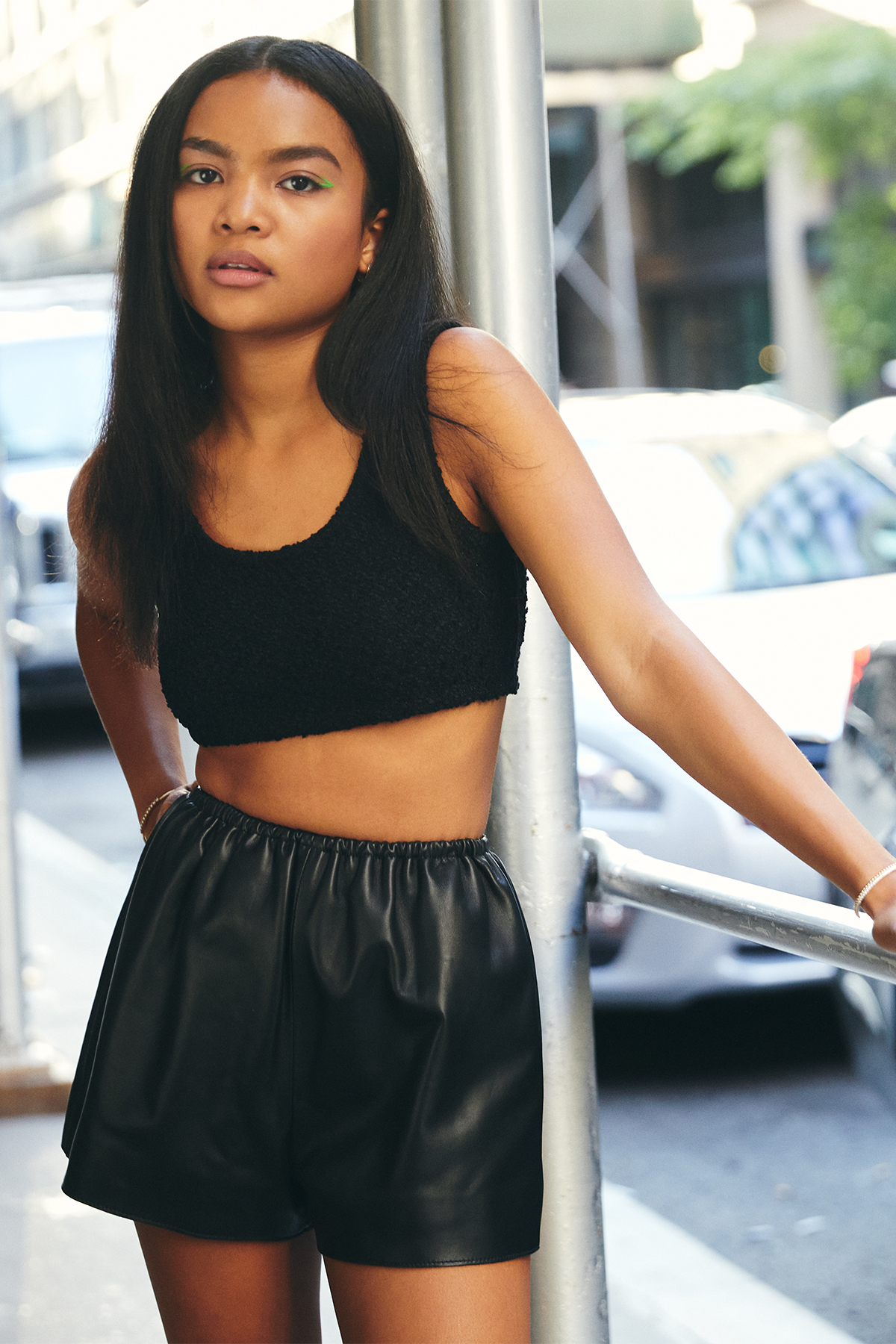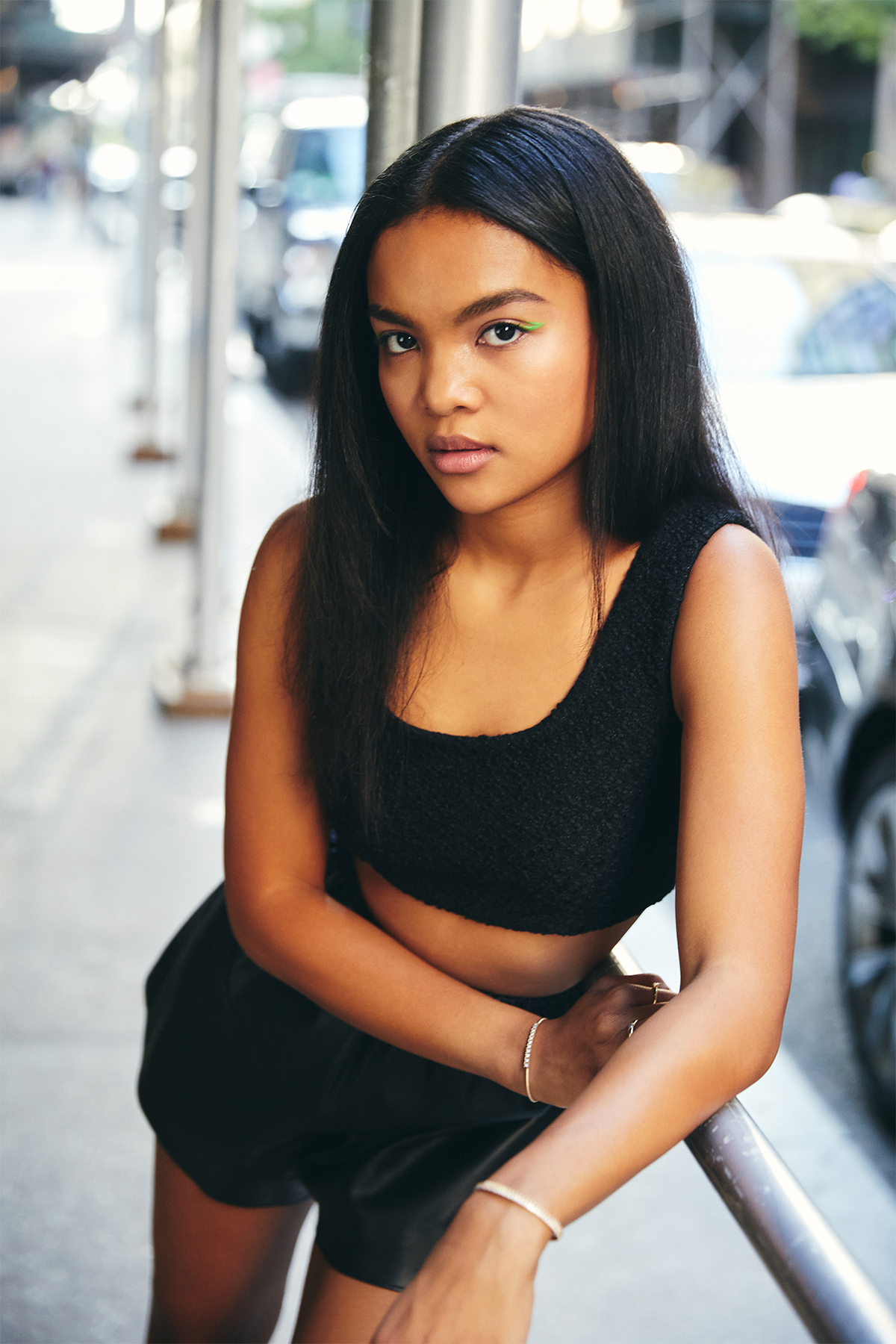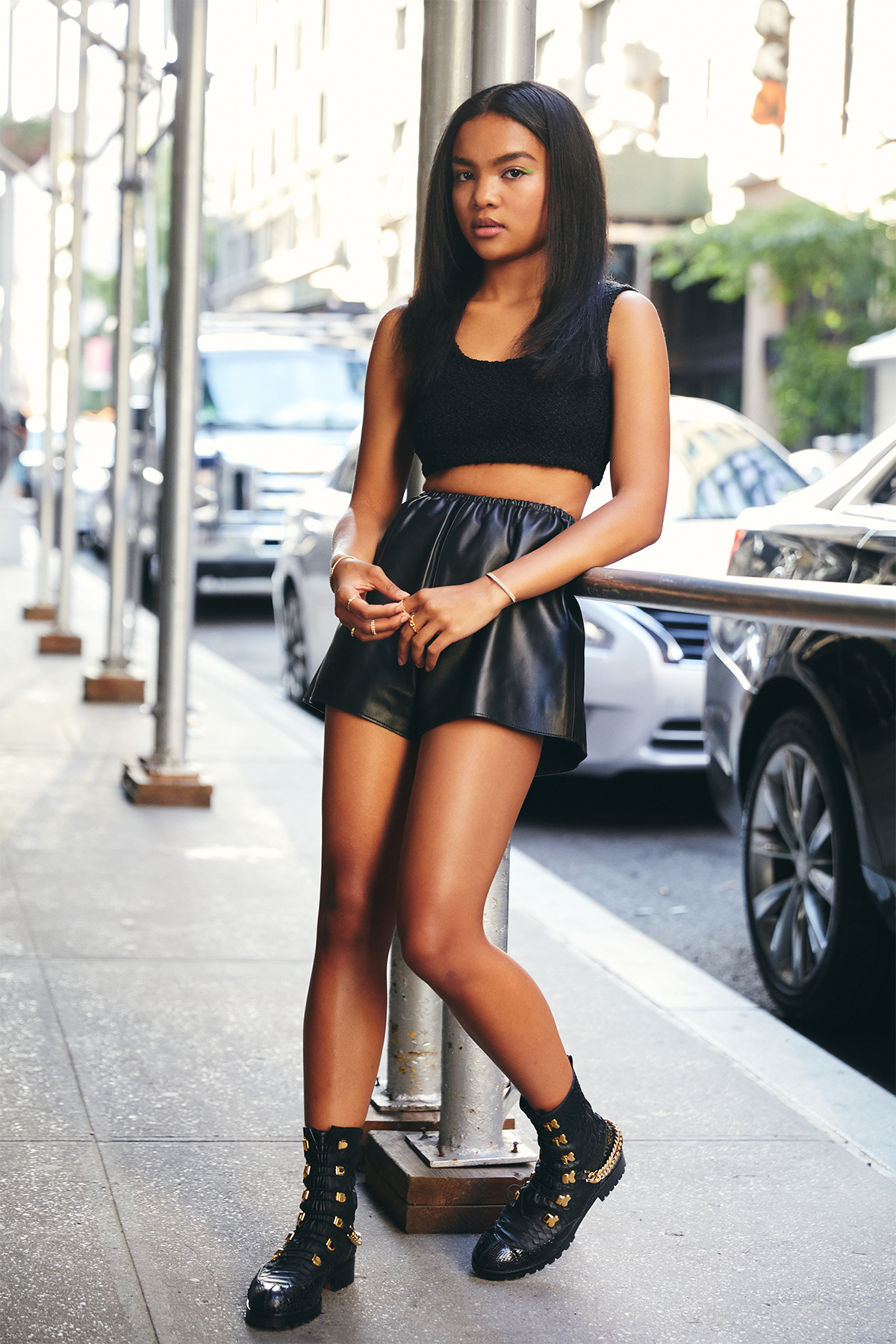Mia Isaac has an exciting streak going. When it comes to working with talented women behind the camera, the newcomer is three for three. Technically, she’s four for four if you count female showrunners, which she does. What started as a happy coincidence is now a badge of honor for the actress—and rightfully so. To be able to start her career with so many brilliant women by her side, Isaac counts herself as one of the lucky ones. “Hopefully, I can keep the streak going,” she says to me over a Zoom call in late June.
With talent like Isaac’s, it’s no wonder the 18-year-old is quickly becoming one of Hollywood’s brightest young stars. Her ability to capture the vulnerability and nuances of being a teen today is nothing short of captivating, and it’s all on display in not one but two films out this month. First is the heartfelt coming-of-age adventure dramedy Don’t Make Me Go, directed by Hannah Marks, which explores the strong bond between a single father and his daughter as they embark on a cross-country road trip. As the rebellious Wally, Isaac more than holds her own opposite a fantastic John Cho and puts it all on the table with an emotional and raw performance that will leave you in your feels. It was my first time watching the actress, and at that moment, I knew she was someone special. Following that up, Isaac has the satire Not Okay, a story written and directed by Quinn Shephard about an ambitious young woman named Danni Sanders (Zoey Deutch) who fakes a trip to Paris on social media in an effort to gain more friends and followers. But when a terrifying incident takes place in the real world, her imaginary trip turns into one of the biggest scandals of the year. While the comedy will have you cringing in the best way, Isaac has some of the film’s most grounded and heartfelt moments playing Rowan, a mass-shooting survivor who finds herself caught up in Danni’s lies.
With what we’ve seen so far, there is no doubt Isaac is poised for a long and inspiring career. Luckily, I had a chance to catch the actress before her whirlwind month kicked off to talk about all things Don’t Make Me Go and Not Okay, what she’s learned from her female directors, and the style cues she takes from her characters.

Let’s start with your first project, Don’t Make Me Go. Can you tell me about your first impression reading the script for this film?
I found out [the ending] before I actually read the script because I did a director’s callback with Hannah [Marks], and she had thought I read the script already based on my original self-tape. When I told her I didn’t, she was like, “Oh, well, spoiler alert!” So I had a little bit of a warning, and I thought that was going to prepare me a little bit for it, but when I actually read it, I still completely broke down in tears. I couldn’t believe it even though I knew it was going to happen. But I fell in love with it right away and really wanted to be a part of it.
Can you tell me about working with director Hannah Marks on this project?
Hannah was the first director I had ever worked with, so I had nothing to compare her to, and now that I’ve done other things, I don’t think I realized at the time how lucky I was to work with her because she really is so attentive, and she really cared about me. This being my first thing, I didn’t really know what I was doing, and I was nervous, and I was scared. She really made me feel comfortable and safe. At the time, I might have taken that for granted a little bit, and I didn’t realize how much she was juggling and how special it was that she was taking the time to be with me and talking through things. There was a day where I had to do this makeout scene, and that was basically my first kiss, so I was so nervous. It was my first kiss and also my first on-camera kiss, and there were so many people in the room, and I was so nervous, and she had to juggle a lot obviously because she is trying to direct a movie, but she took the time to sit with me and be like, “Are you okay?” and talk it through so I wasn’t as nervous. Just little things like that, she really made me feel comfortable and safe.
Don’t Make Me Go is anchored by a special father-daughter relationship, so the on-screen chemistry between you and John Cho is a really important aspect of this film. Did you and Cho spend time together prior to filming to help build that relationship?
Not prior to filming. I got to New Zealand… Well, I got out of quarantine in New Zealand like a week before we started shooting, so I didn’t have that much time to go from the very beginning. I think we did like two rehearsals before we actually started shooting, but I don’t think we really even needed to prepare ourselves because we just started, and it felt natural, and we fell into it really easily. We shot all the stuff at our house first, which felt really nice because it established that dynamic of “This is our house, and you’re my dad.” One of the first scenes we shot is that argument in the kitchen, and I think that really set the tone for how it was going to be between us. And we also got to know each other over the course of the shoot. We played games and listened to music and hung out on the weekends, and he really felt like my dad during that time.
Have you stayed close since then?
Yes, for sure. I just texted him for Father’s Day. It was funny because I was in New Zealand with my mom—because of quarantine, my whole family couldn’t come—and I’m really close with my dad, and it weirdly felt like John was filling that space almost. He would give me advice, and that was something my dad always did. It was weird at Tribeca [Film Festival]. My dad and John met for the first time, and I was so worried they wouldn’t get along, but they really got on well, which I’m glad for.
This is very much a coming-of-age story for Wally, and you were of similar age to her when filming this project. In what ways could you relate to or learn from her?
I related to her so much. It felt like playing a version of myself almost just because we are at the same age, and we were going through a lot of the same things. She is going through all of this boy stuff, and that was fun to play. And to wear her clothes, like the fashion stuff, and [be] in her room, she felt really close to me. … [This] is something Hannah made sure of. A lot of her character is similar to me, and that was something that we created after I booked the role. Wally has a lizard, and that wasn’t in the original script, but when I was doing my chemistry read, we were on Zoom, and Hannah saw my cage with my lizard in the back, and she was like, “Oh, you have a lizard! That would be cool if Wally had a lizard.” Wally has a scar on her eyebrow, and that is something that comes up in a scene and so many other little things. When I was in quarantine in New Zealand, production sent over art supplies, and I would make paintings and drawings for them to hang up in Wally’s room. So it just felt like there was so much of myself in Wally.
What is your lizard’s name?
My lizard’s name is Khaleesi.

Has working on DMMG made you think differently about your own relationship with your parents or how you want to make use of your time on earth?
I don’t think it’s made me think differently. I’ve always been very close to my parents, and I try not to push them away. I like spending time with them and always have. I watched the film for the first time with both of them, and we all cried together—especially because of that home video at the end, which originally was my dad’s video. All of that stuff that John says in the video is exactly what my dad says. My dad had always felt a certain way about that video already, so him seeing that on-screen with me made him really emotional, so we just sat in that moment together, the three of us, and just appreciated each other.
Can we talk about this collection of bracelets you have on your arm?
That’s another thing that’s really similar with Wally … and also [my other character], Rowan, because I wear a lot of my own bracelets for Not Okay. Each one has a different story. I have one that I got in Ecuador on a school trip when I was 15. I have this one that I got in New Zealand while filming Don’t Make Me Go. This one says “not okay” on it and was a gift one of my sisters made for me. She braided some string together. They are all different little things.
So up next this summer, you have the film Not Okay with Zoey Deutch, which is directed by another talented young woman, Quinn Shephard. I’m sensing a trend here.
I was saying earlier that I started a streak of having only worked with female directors. I just did something last month, and it was another young female director, and Black Cake is a female showrunner, a male director for the pilot, but I still count it because female showrunners still count. But hopefully, I can keep that streak going.
Scammer stories are really captivating audiences right now. What do you think is inherently interesting about these people and stories?
Personally, I don’t like watching these kinds of stories because I get anxious because you know at a certain point the lie is going to come out and everyone is going to be mad. Whenever I watch a movie, I project on the main character, so I’m like, “I don’t want people to be mad at me!” Everyone gets mad at the main character at that one point when the lie falls apart, and I’m just anxiously on the edge of my seat waiting for that point. So I don’t like watching those types of movies. You are right, though. This is something that is coming up a lot. I think it’s easier to lie on social media, so I think that’s why this is a story that has become so popular.
The film serves as a commentary on the fast and loose world of social media and how manipulative these apps can be. What is your own personal relationship to social media?
Pre–Not Okay, my social media was just me and my friends. I don’t think I had that many followers, and it wasn’t something that I worried about really. I never worried about what I was going to post. It was mostly just like, “Hey, I’m here right now. Look at this.” Like, I’m on vacation or something, or I’m with my parents. But I think it was weird for me because Not Okay was a unique situation, in that it blew up while we were filming on TikTok and on Instagram, and I gained a good amount of followers from it. It almost gave me anxiety (like, why are so many people following me?), but I felt like I had to accommodate or be entertaining, which made no sense because before it was something that I had for my personal life. I guess I’m trying to be careful to not let people who I don’t know affect me and the way I am on social media. It was fun for me before, and I’m trying to keep it that way.

It did look like you had a lot of fun filming this movie.
Going back to the social media thing, doing that was a really fun part of it. On Don’t Make Me Go, it was all “no posting,” and I was never on my phone, but on Not Okay, we used that to our advantage and were constantly having fun and making TikToks and doing transitions and dances and things like that. Sometimes, I would forget that we’re actually supposed to be filming a movie because we were having so much fun. What I also loved about Not Okay was that we gave everything meaning, and we had so much fun doing that. The outfits and wardrobe were a big part of that. Danni’s outfits are really cool, but we also spent a lot of time talking about Rowan’s outfits and what those things could mean emotionally, which I had so much fun with. When she goes to confront Danni at the end of the movie, she’s wearing this jacket, which was a metaphor for protection and her protecting herself. And Rowan wearing red a lot in the movie represented something she talked about in the beginning—red being a color that is a part of her trauma. Those kinds of things are really fun.
Your character Rowan suffers trauma from being present during a school shooting, which unfortunately is an all-too-real story line right now. What kind of prep did you do to get in the headspace of Rowan?
I met with a trauma consultant. I think Zoey might have as well, but that was something that was provided by production. We had a few meetings, and it was really interesting to talk to her and go through some physical things with trauma. That was really interesting because that guided me through the emotional process, like panic attacks and hyperventilation and numbness, just things I would have never thought about. Another great thing that really helped me connect to Rowan was the fact that she uses spoken word as an outlet for her feelings, so I could always refer back to the things that she sat down and wrote out to find how she was feeling or thinking.
You mentioned loving the wardrobe piece of it. In terms of your own style, would you say you are closer to a Wally or Rowan?
I would think of myself as a perfect mix [of the two]. It’s weird because while I was shooting Not Okay, I found myself dressing more like Rowan, and I was like, “What am I doing?” But what I loved about both of those characters is they felt similar to me in different ways, so my personal style is a mix of both, which is cool.
This is a big summer for you, but what are you looking forward to most in the next few years of your career?
I hope I get to work with Hannah and Quinn again. They are amazing. I’ve learned so much from working with them, and I look up to them so much that I want to follow in their footsteps. I’d love to write something of my own and direct something of my own. That’s always been a dream of mine that I never really fully thought out because I didn’t think it was something that’s possible. Working with two young female filmmakers and seeing them doing it, it makes me want to do it too.
Catch Mia Isaac in Don’t Make Me Go, now streaming on Amazon Prime Video, and Not Okay, on Hulu July 29.
Photographer: Stephanie Diani
Stylist: Thomas Carter Phillips
Hairstylist: Cheryl Bergamy
Makeup Artist: Yumi Mori

